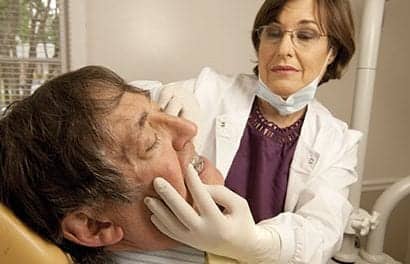Last Updated: 2008-07-17 16:23:42 -0400 (Reuters Health)
Cheyne-Stokes respiration and central sleep apnea are common in patients with pulmonary hypertension, and obstructive sleep apnea also occurs, according to findings published in the June issue of Chest.
"Cheyne-Stokes respiration (CSR) and central sleep apnea (CSA) are highly prevalent in patients with severe congestive left ventricular heart failure," write Dr. Konrad E. Bloch and colleagues from University Hospital of Zurich, Switzerland. They examined whether sleep-disordered breathing is also prevalent in patients with right ventricular dysfunction due to pulmonary hypertension.
Thirty-eight outpatients (mean age, 61 years) with pulmonary arterial hypertension (n = 23) or chronic thromboembolic pulmonary hypertension (n = 15) were included in the study. All patients underwent ambulatory cardiorespiratory sleep studies including pulse oximetry. Laboratory-based polysomnography was performed in 22 patients.
"CSR/CSA was very common, with 17 of 38 patients (45%) having an apnea-hypopnea index of at least 10 per hour," the team reports. "Four patients had at least 10 obstructive events per hour."
When the researchers compared patients with 10 or more CSR/CSA events per hour with those with less than 10 (excluding those with 10 or more obstructive apnea/hypopnea events per hour), they found no differences in hemodynamics, NYHA class, or sleepiness. However, patients with 10 or more CSR/CSA events per hour had significantly reduced quality of life in the physical domains.
"Ambulatory cardiorespiratory sleep studies accurately identified patients with sleep-disordered breathing in comparison to polysomnography," Dr. Bloch and colleagues report.
They conclude: "Evaluation of patients with pulmonary hypertension by polysomnography or by ambulatory cardiorespiratory sleep study seems justified to identify potentially treatable central and obstructive sleep apnea that may additionally impair the already compromised pulmonary hemodynamics."
Chest 2008;133:1375-1380.



